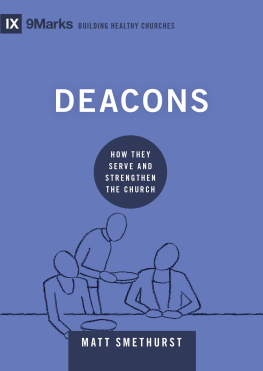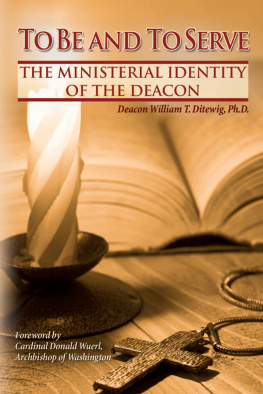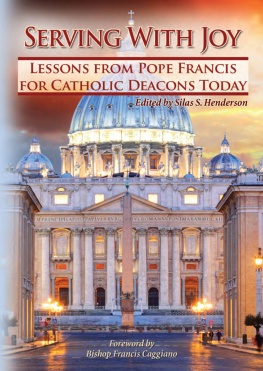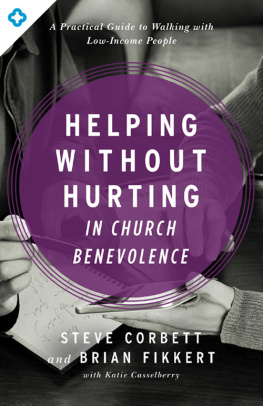Table of Contents
Landmarks
The Nazis, it turns out, did not like deacons.
After the Netherlands fell to Germany in 1940, deacons in the Dutch Reformed Church rose up to care for the politically oppressed, supplying food and providing secret refuge. Realizing what was happening, the Germans decreed that the office of deacon should be eliminated. Responding in a General Synod on July 17, 1941, the Dutch believers resolved, Whoever touches the diaconate interferes with what Christ has ordained as the task of the church.... Whoever lays hands on diakonia lays hands on worship!
The Germans backed down.
Deacons Through the Ages
Most diaconal stories are, of course, less historically momentous. Rarely are they less beautiful. For two thousand years deacons have shone as theyve served churches and communities around the globe. The witness of history is plain: a congregation without biblically functioning deacons is impoverished, but a congregation with them is incalculably rich.
How, then, have deacons functioned through the ages? The question is neither irrelevant nor dull; it is practical. If you are a follower of Jesus , then Christian history is your history. Studying it is like opening a photo album and flipping through your family heritage.
So lets begin. Embark with me on a flyover surveyadmittedly fast and fragmentaryof the diaconal landscape since the apostolic age.
Early Church
Deacons were held in a place of honor in Christianitys earliest centuries. Based on the precedent of Acts 6:17a passage generally seen to establish, or at least preview, the officedeacons in the early church were tasked with supporting the work of pastors by caring for the outward or physical concerns of church life.
Historian Charles Deweese aptly summarizes:
They visited martyrs who were in prison, clothed and buried the dead, looked after the excommunicated with the hope of restoring them, provided the needs of widows and orphans, and visited the sick and those who were otherwise in distress. In a plague that struck Alexandria about AD 259, deacons were described by an eyewitness as those who visited the sick fearlessly, ministered to them continually, and died with them most joyfully.
Indeed, it was this kind of risky, self-giving lovemodeled often by deaconsthat bewildered the Roman world. As the African bishop
It is all too easy to lose sight of the spiritual value of deacons because their role is so practical in the life of the church. But many of the earliest deacons were giants of the faith, and they defended it with valor. Two stories must suffice.
First, lets travel to ancient Rome, epicenter of the mightiest empire on earth. Only eight years have passed since Emperor Decius sought to exterminate all who refused to pledge allegiance to his sovereign rule. Untold Christians were killed. It is now AD 258, and a man named Laurence is one of seven deacons serving in Rome; his task is to oversee the churchs money and distributions to the poor. In August the news hits: Deciuss successor, Valerian, has issued a chilling edictall bishops, priests, and deacons must be rounded up and killed.
Laurence is soon taken before the magistrate. The offer: surrender the treasure of the church, and you will be freed . The deacon agrees. He only requests three days to retrieve it. Leaving the court, Laurence wastes no time. He entrusts the churchs money to safe hands, and then gathers together the sick, the aged, the poor, the widowed, and the orphaned. At last he returns to the court, pitiful band in tow. Incensed by the commotion, the magistrate demands an explanation. Laurence responds, Sir, I have brought what you asked for. Then, gesturing toward the people hes gathered, he declares, These are the treasures of the church. Subsequently sentenced to a martyrs death, the deacon endures the flames with startling calm, even quipping to his executioners, You may turn me over; I am done on this side. The spectacle of Laurences profound courage makes a great impression on the people of Rome, leading to many conversions.
Now fast-forward seventy years, and lets journey southeast to Telzeha (in modern-day Turkey). Persecution against Christians has again intensified, this time under Licinius. New emperor, new edict: citizens must repair the altars and sacrifice to the god Jupiter . What happens? A deacon rises up:
Now Habib, who was of the village of Telzeha and had been made a deacon, went secretly into the churches in the villages. He ministered and read the Scriptures, encouraged and strengthened many by his words, and admonished them to stand fast in the truth of their belief and to not be afraid of the persecutors....
Many were strengthened by his words... and were careful not to renounce the covenant they had made. When the men appointed with reference to this particular matter heard of it, they informed [Licinius], the governor in the town of Edessa: Habib, who is a deacon in the village of Telzeha, goes about and ministers secretly in every place, and resists the command of the emperors, and is not afraid.
Not afraid indeed. Enduring a barrage of questions from the governor without wavering in his faith, Habib is burned at the stake. Stories like these offer a glimpse into the breathtaking conduct of the earliest deaconsand their steady yet staggering impact on the Roman world.
As the church sought to manage geographical expansion and as various heresies popped up to threaten the faith, a formalized hierarchy was developed to streamlineand centralizedecision-making authority within the office of bishop. So rather than only two church offices (bishops and deacons) there were now three: bishops (overseers), presbyters (elders or priests), and deacons. With the advent of this monarchical episcopate systemone bishop overseeing a geographic areathe primary role of deacons shifted from agents of charity to, essentially, secretaries to the bishop. They increasingly functioned as on-the-ground liaisons between the regions bishop and its local congregations.
Despite gradual distancing from the New Testament pattern, deacons continued to perform biblical tasks. Yet this didnt hold. Mark Dever summarizes the fateful decline:
As the monarchical episcopate developed, so did a kind of
Middle Ages
With this shift away from charitable work, two developments in the Middle Ages caused the diaconate to deteriorate even further.
The time had come for a diaconal reformation.
John Calvins Influence
No Reformer was more influential in restoring the diaconate to its ancient modelof ministering help to the poor and distressedthan John Calvin. Upon returning to Geneva in 1541, Calvins first official act as pastor was to present to the city council a detailed plan for the order and governance of the church. These Ecclesiastical Ordinances called for the installation of deacons along with pastors, doctors (teachers), and elders. Historian Timothy George notes the high esteem in which Calvin held the diaconate:
Deacons were public officers in the church entrusted with the care of the poor. He urged that they be skilled in the Christian faith since, in the course of their ministry, they will often have to give advice and comfort.... Calvin admitted that the diaconate could sometimes serve as a nursery from which presbyters are chosen, yet he opposed the Roman custom of making the deacon the first step to the priesthood. This practice was an invidious undermining of a highly honorable office.
Under the leadership of Calvin, as well as contemporaries like Martin Bucer (14911551), deacons again began to serve not merely as protgs of priests but as ministers of mercy.
Reformation to Modern Era
Ever since Calvin gave fresh attention to the diaconate more than five centuries ago, the office has taken various shapes among Protestants.









